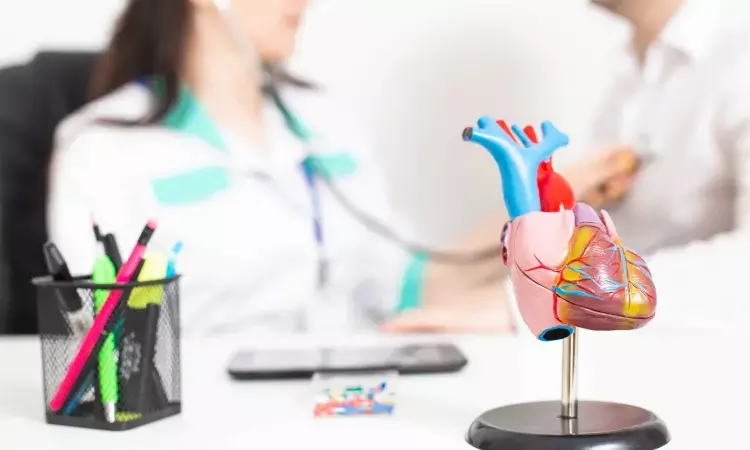- Home
- Medical news & Guidelines
- Anesthesiology
- Cardiology and CTVS
- Critical Care
- Dentistry
- Dermatology
- Diabetes and Endocrinology
- ENT
- Gastroenterology
- Medicine
- Nephrology
- Neurology
- Obstretics-Gynaecology
- Oncology
- Ophthalmology
- Orthopaedics
- Pediatrics-Neonatology
- Psychiatry
- Pulmonology
- Radiology
- Surgery
- Urology
- Laboratory Medicine
- Diet
- Nursing
- Paramedical
- Physiotherapy
- Health news
- Fact Check
- Bone Health Fact Check
- Brain Health Fact Check
- Cancer Related Fact Check
- Child Care Fact Check
- Dental and oral health fact check
- Diabetes and metabolic health fact check
- Diet and Nutrition Fact Check
- Eye and ENT Care Fact Check
- Fitness fact check
- Gut health fact check
- Heart health fact check
- Kidney health fact check
- Medical education fact check
- Men's health fact check
- Respiratory fact check
- Skin and hair care fact check
- Vaccine and Immunization fact check
- Women's health fact check
- AYUSH
- State News
- Andaman and Nicobar Islands
- Andhra Pradesh
- Arunachal Pradesh
- Assam
- Bihar
- Chandigarh
- Chattisgarh
- Dadra and Nagar Haveli
- Daman and Diu
- Delhi
- Goa
- Gujarat
- Haryana
- Himachal Pradesh
- Jammu & Kashmir
- Jharkhand
- Karnataka
- Kerala
- Ladakh
- Lakshadweep
- Madhya Pradesh
- Maharashtra
- Manipur
- Meghalaya
- Mizoram
- Nagaland
- Odisha
- Puducherry
- Punjab
- Rajasthan
- Sikkim
- Tamil Nadu
- Telangana
- Tripura
- Uttar Pradesh
- Uttrakhand
- West Bengal
- Medical Education
- Industry
Calcium supplementation not linked to increased risk of heart disease or stroke

Calcium supplements are usually taken to treat or prevent bone disease, such as osteoporosis. Studies in the past found that calcium supplements increased the risk of heart disease, particularly in healthy, postmenopausal women. But other studies have said calcium supplements don't increase the risk.
Calcium supplementation is not associated with the risk of cardiovascular diseases or stroke, finds a recent study conducted by Dr Ming Gin Sim and associates. The study has been published in Heart Lung and Circulation.
In this study, data was collected and Pooled from PubMed, Embase, Scopus, and the Cochrane Central Register of Controlled Trials (inception to August 6 2021). RCTs focused on the relationship between calcium supplementation and cardiovascular disease or stroke incidence. Based on the PICO criteria, articles were screened independently by two authors. The third author resolved the disagreement.
Previous data collected from some observational studies and RCTs highlight an association between calcium supplementation and increased risk of cardiovascular disease. The findings of earlier meta-analyses and observational studies report contradictory results. Considering this background, researchers, through this meta-analysis, determined the difference in associated risks of calcium supplementation with cardiovascular disease and stroke in RCTs.
They included twelve RCTs in the meta-analysis. Calcium supplementation was not associated with myocardial infarction, total stroke, heart failure admission, or all-cause/cardiovascular mortality. The findings did not affect subgroup analysis focusing on calcium monotherapy/calcium co-therapy with vitamin D, female sex, follow-up duration, and geographical region.
Concluding further, researchers mentioned that Calcium supplementation is not associated with MI, total stroke, heart failure admission, and cardiovascular/all-cause mortality.
Following the intake of calcium supplements, there is an acute rise in serum calcium levels which is major concern among the researchers. Calcium intake from dietary sources does not seem to increase cardiovascular risk, while calcium supplements might raise CHD risk.
Further investigations are warranted to examine and understand these associations.
Reference:
Ming Gin Sim et al. Association Between Calcium Supplementation and the Risk of Cardiovascular Disease and Stroke: A Systematic Review and Meta-Analysis Published: September 22, 2023 https://doi.org/10.1016/j.hlc.2023.07.008
BDS, MDS in Periodontics and Implantology
Dr. Aditi Yadav is a BDS, MDS in Periodontics and Implantology. She has a clinical experience of 5 years as a laser dental surgeon. She also has a Diploma in clinical research and pharmacovigilance and is a Certified data scientist. She is currently working as a content developer in e-health services. Dr. Yadav has a keen interest in Medical Journalism and is actively involved in Medical Research writing.
Dr Kamal Kant Kohli-MBBS, DTCD- a chest specialist with more than 30 years of practice and a flair for writing clinical articles, Dr Kamal Kant Kohli joined Medical Dialogues as a Chief Editor of Medical News. Besides writing articles, as an editor, he proofreads and verifies all the medical content published on Medical Dialogues including those coming from journals, studies,medical conferences,guidelines etc. Email: drkohli@medicaldialogues.in. Contact no. 011-43720751


